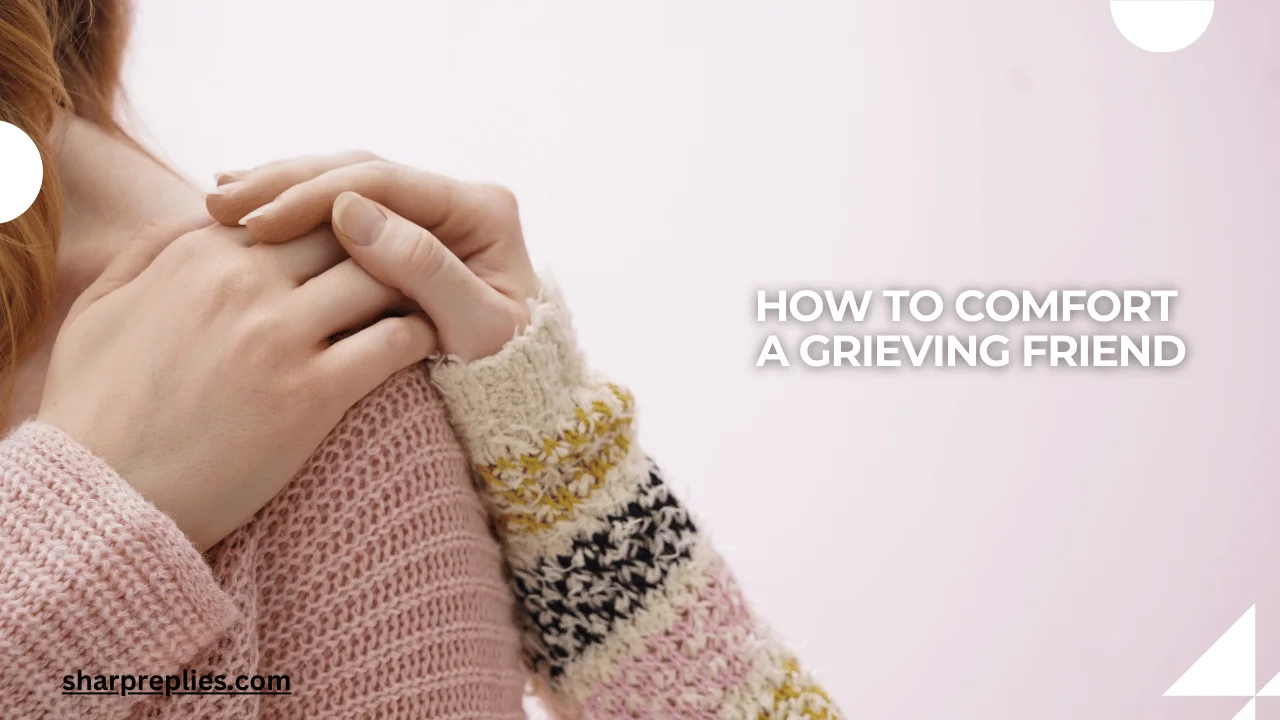Grief is one of the most profound emotions a person can experience. Whether it’s the loss of a loved one, a cherished pet, or a significant life change, the pain can be overwhelming. When a friend is grieving, it can be difficult to know what to say or do.
You want to offer comfort, but you’re unsure of the right approach. It’s natural to feel unsure, but showing up and being present is often the most important thing you can do.
In this article, we explore how to comfort a grieving friend effectively. Grief isn’t something that can be “fixed” overnight, but your support can make a meaningful difference. We will look at practical steps, emotional tools, and simple gestures that will allow you to be a source of comfort during a difficult time.
If you want to help but don’t know where to start, this guide will give you the confidence to offer meaningful support and ensure that your grieving friend knows they aren’t alone in their pain.
Contents
- 1 Understanding Grief and Its Impact
- 2 Listening and Providing Emotional Support
- 3 Offering Practical Help and Support
- 4 Respecting Their Grieving Process
- 5 Offering Comfort Through Presence and Encouragement
- 6 Conclusion:
- 7 FAQ’s
- 7.0.1 What is the best way to comfort a grieving friend?
- 7.0.2 How can I know if my friend needs space?
- 7.0.3 What should I say to a grieving friend?
- 7.0.4 How long should I offer support to a grieving friend?
- 7.0.5 Should I encourage my friend to seek professional help?
- 7.0.6 How do I avoid saying the wrong thing?
Understanding Grief and Its Impact
Grief can be an isolating experience, and each person processes it differently. It is not just an emotional experience, but it can also have physical and mental effects. People who are grieving might experience feelings of shock, anger, confusion, or even guilt.
Their daily routines may be disrupted, and they may feel emotionally drained or disconnected from others.
It’s important to understand that grief doesn’t follow a linear path. It can come in waves, and there’s no right or wrong way to grieve.
What might be comforting for one person could be overwhelming for another. Empathy is key here, as understanding your friend’s emotional state will help you provide the kind of support they need.
Additionally, grief can make even the simplest tasks feel like monumental challenges. By being aware of the emotional toll grief takes, you can better anticipate what your friend might need and how to be there for them during this difficult period.
Listening and Providing Emotional Support
One of the most powerful ways to comfort a grieving friend is through active listening. Sometimes, your friend may not even need you to provide solutions or words of wisdom—what they need most is someone who listens without judgment.
Listening with compassion allows your friend to process their emotions in a safe, supportive space.
When your friend opens up, it’s important to resist the urge to interrupt or try to “fix” their pain. Instead, offer a gentle presence. Acknowledge their feelings with phrases like, “I can’t imagine what you’re going through, but I’m here for you.”
Sometimes, simply validating their emotions can be a great comfort. Grief is messy, and the best way to support a grieving friend is to allow them the freedom to express their feelings—whether that’s crying, sharing memories, or even sitting in silence together.
Empathy also extends to being patient with your friend. Grief can take time to heal, and it’s important to recognize that your friend’s needs may change daily. Stay adaptable and show your friend that you’re available when they’re ready to talk or lean on you.
Offering Practical Help and Support
When someone is grieving, even the smallest tasks can feel overwhelming. Offering to help with practical tasks can be a huge relief. Rather than simply saying, “Let me know if you need anything,” which can feel too vague for a grieving person, offer specific help.
You could say:
- “I’ll take care of dinner for the next few nights.”
- “I can help with your laundry or cleaning up around the house.”
- “I’ll drive you to appointments if you need a ride.”
By offering concrete support, you make it easier for your friend to accept help. This type of assistance ensures that their basic needs are met while they focus on their emotional recovery. Small, consistent acts of kindness can help ease the burden during a difficult time and show your friend that you care deeply about their well-being.
In addition, checking in regularly can be reassuring. Grief doesn’t have a set timeline, and offering ongoing support, even months after the loss, can show your friend that you haven’t forgotten their pain.
Respecting Their Grieving Process
Every person experiences grief differently, and it’s crucial to respect your friend’s individual grieving process. Don’t rush them to “move on” or expect them to follow a certain timeline. Some people may find comfort in talking about their loved one, while others may prefer silence or solitude.
Respecting their boundaries is an essential part of supporting someone who’s grieving. If your friend needs time alone, honor that request without taking it personally. Similarly, if they reach out to talk, be available and attentive.
Patience and respect for their emotional journey can provide your friend with the space to grieve on their own terms.
It’s also important to recognize when your friend may need professional support. If their grief seems unmanageable or they are showing signs of prolonged depression, gently encourage them to speak with a counselor or therapist.
Professional support can complement your emotional care and give your friend additional tools to cope.
Offering Comfort Through Presence and Encouragement
Sometimes, the best way to comfort a grieving friend is through your physical presence. Being there, even in silence, shows your friend that they are not alone.
Comforting gestures, such as holding their hand, giving a hug, or just sitting together, can be incredibly healing. Your friend may not always know how to express what they need, but your supportive presence will speak volumes.
In addition to being physically present, offering gentle encouragement can help your friend feel hopeful for the future. Let them know it’s okay to grieve, but remind them that healing is possible over time. Use encouraging phrases like:
- “You don’t have to go through this alone. I’m with you every step of the way.”
- “Take things one day at a time. Healing doesn’t have a timeline.”
Reassuring your friend that they have a future beyond their current grief can help them slowly rebuild hope. While healing takes time, your encouragement will help your friend feel supported, even on the hardest days.

Conclusion:
Comforting a grieving friend is not about having the perfect words or fixing their pain.
It’s about being present, listening with compassion, and offering support in ways that matter to them. By understanding the nature of grief, offering emotional support, and being patient with their process, you can make a meaningful difference in their journey through loss.
Remember that grief is unique to each person, and your friend may not always know how to express what they need.
Your role is to offer love, understanding, and consistent care without judgment. While you can’t take away their pain, your support will make them feel seen, heard, and valued during one of the toughest times in their life.
FAQ’s
What is the best way to comfort a grieving friend?
Listening with empathy, offering practical help, and being there for your friend without trying to “fix” their grief are the best ways to offer comfort.
How can I know if my friend needs space?
Pay attention to their body language and verbal cues. If they seem withdrawn or ask for privacy, respect their need for space.
What should I say to a grieving friend?
Simple, empathetic statements like, “I’m so sorry for your loss. I’m here for you,” can offer comfort without overwhelming them.
How long should I offer support to a grieving friend?
Grief can last months or longer, so continue offering support in the form of regular check-ins and practical help long after the funeral or immediate loss.
Should I encourage my friend to seek professional help?
If your friend’s grief seems overwhelming or prolonged, gently suggest that they consider speaking with a counselor or therapist for additional support.
How do I avoid saying the wrong thing?
Avoid offering clichés or rushing their grief process. Instead, focus on listening and being present with them.








